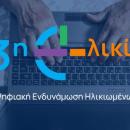Digital Compass - Germany
The initiative ‘Digital Compass’ was originally founded in 2015 as a joint project between the Federal Association of Senior Citizens' Organizations (Bundesarbeitsgemeinschaft der Seniorenorganisationen) and ’Promoting Cybersecurity and Digital Competency in Germany’ (Deutschland sicher im Netz e.V.) for supporting elderly people in Germany. With the support of the German Ministry for Consumer Protection, the project is funded by the Federal Ministry of Justice and Consumer Protection (Bundesministerium der Justiz und für Verbraucherschutz (BMJV). The initiative started at a time when digitalisation's impact was not so pronounced as today, yet the idea that that older people needed some support with their first steps into the digital world was becoming increasingly clear.
Background and context
And indeed, as the European continent is fast becoming more digital, progress or attention seems to exclude a growing older cohort of citizens. A recent Eurobarometer survey, addressing the Digital Decade targets, shows that those aged 55 or over are substantially less likely to consider that the digitalisation of day-to-day public and private services is making their lives easier to some extent, compared to those aged 15 to 24.
Older people are a key demographic. The World Economic Forum estimates that by 2050, the number of people 60+ will double to 2.1 billion globally, equal to 26% of the population. Given this significant portion, the goal of the German Digital Compass project is to support older people overcome digital barriers and enable digital inclusion. This is made possible by many volunteers across different locations, where Digital Compass operates, and joint efforts on-site. Since its kick off, the initiative has grown to encompass other target groups too: after establishing local centres offering digital services for seniors, the target group was expanded in 2022 to include people with hearing, visual, and mobility impairments, identified as an increasingly growing number of users. In this way, existing offerings can be designed to be accessible and inclusive for all people. In this way, existing offerings can be designed to be accessible and inclusive for all people. Even on an individual basis, elderly people and especially people with mobility restrictions can gain access to the digital world with students in so-called "learning tandems", regardless of location or time.
About this initiative
In today's digitalised world, true social participation brings about the need for digital skills. This is especially the case with vulnerable target groups such as those living with sensory and mobility impairments. The ability to use digital technology in a safe and confident manner is associated with a more independent and self-motivated day-to-day life. Participation is facilitated by local multipliers. More specifically, elderly citizens and people with hearing, visual and mobility impairments can benefit from the project by joining one of its various face-to-face meetings or online sessions. Ultimately, organisations and municipalities can gain many benefits from such meetings - and the same goes for self-help organisations, lobby and advocacy groups, or social partners.
Since it is a nationwide project in Germany, the project in its form is unique. However, projects such as such as "DigitalPakt Alter" or "Digitaler Engel" may have served as inspiration, since similarities can be noticed. Notably, "Digital Compass" seems to be an inspiration for others too: the initial materials and learning resources of the initiative are often used in other projects.
Main objectives
Throughout the project, a key goal was linked to raising awareness of those living with sensory and mobility impairments in a world that is more and more digital. Within the project's scope, a training curriculum for multipliers has been created, and training sessions have been launched. The objective was to reach 30,000 elderly citizens as well as citizens with sensory or mobility impairments and engage 3,000 knowledge disseminators through online events. Over 3 years and under the project, a total of 300 both in-person and digital events should be organised, and 30 educational materials produced. The project also aims to get to 2,000 press mentions and reach 200,000 people on social media during that time.
Why is this a good practice?
Since its start, the initiative has achieved a sizeable impact. More than 250 Digital Compass points have been set up. Around 332 learning tandems have been matched and carried out in cooperation with 9 participating universities by the end of the summer semester in 2025. Over 300 online events have taken place since the beginning of the project, reaching approximately 10,000 participants. In addition, 46 learning resources and 16 podcast episodes have been created and made available to all. The project has counted a total of 1,472 mentions so far, with a statistical reach of almost 80 million.
In part, this success could be due to the well-thought of communication and dissemination strategy of the project. Its website is regularly updates with the latest events, articles, and information. It is also the place where learning resources and materials are uploaded. The project makes use of several newsletters - including some of its partners' - while events are also promoted by project partners and shared through various social media channels, sometimes also from cooperating universities. All in all, the project's impact has also been reflected by media, with the initiative featured in several magazines and local newspapers. Naturally, the project scores high in accessibility, with the learning resources being made available for free, and content tailored to suit the needs of an audience with visual or mobility impairments.
Coming to an end October 2025, the project's ideas remain, pointing to a flair of sustainability: a new initiative is already in the making, aimed at expanding the target group. Up to this day, there is still high demand for digital support services, especially in rural areas and the new federal states in Germany - and as digitalisation picks up its speed, the goal is eventually to open up locations throughout the country.








